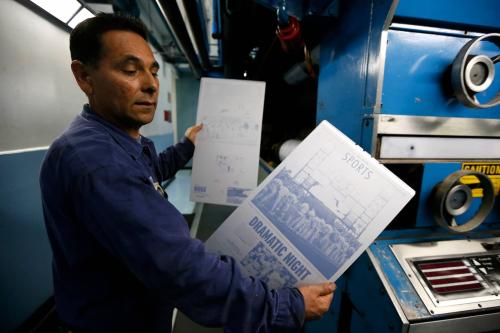Ten years ago, Stephen Hess interviewed Mike Wallace at an event organized with Marvin Kalb at Brookings. In light of Wallace’s death, both scholars reflect on interviewing and working with the legendary journalist.
On Interviewing Mike Wallace
Stephen Hess, Senior Fellow Emeritus, Governance Studies
When he died on Saturday he was 93, and his obituary was right in the middle of Monday’s page one, the New York Times. That’s fame. And it doesn’t happen to many journalists.
Mike Wallace had just turned 84 when Marvin Kalb and I interviewed him at Brookings on May 22, 2002. (Click here to read the transcript or watch the interview on CSPAN.) The vigor of his responses is obvious. What Marvin and I also learned was how much Wallace was still in the arena, making sure that there was no diminution of his 60 Minutes persona.
Marvin had been his colleague at CBS. My only connection with Wallace was almost a half century of watching him dissect those brave enough to face him on camera, starting in New York in the 1950s on the long-forgotten DuMont television network.
Wallace was a bully. Fortunately most of the time he was a bully for us. We were to learn a lot of things about public people and public events that we deserved to know and wouldn’t have known otherwise. “Forgive me” was how Wallace often started a question that you knew the interviewee was not likely to forgive.
Our interview with Wallace was billed as “The State of Broadcast Journalism” in the year of terror following 9/11. Marvin put some very serious questions to Wallace about what the media did and did not do. They were old friends. But as you watch the interview, you might image Marvin prefacing his questions, “Forgive me, Mike.”
Recalling Mike Wallace
Marvin Kalb, Guest Scholar, Foreign Policy
Mike’s interview with Iran’s revolutionary hero, the Ayatollah Khomeini, is, in my judgment, the best example of classic Mike: he had an undeniable scoop (a “get,” as we put it in tv jargon), it was dramatic television, and it was a glorious opportunity for Mike to perform, to demonstrate his skill as an interviewer. There was the controversial and feared Ayatollah himself, surrounded by his secretive henchmen, and there was the fearless, indomitable Mike, surrounded by cameramen, soundmen, light men, producers—his henchmen. Both men sat crosslegged on rugs.
Mike, always armed with more questions than he could possibly ask, had just learned that Egypt’s President Sadat had called the Ayatollah a “lunatic,” and Mike wanted somehow to arouse the Ayatollah’s wrath and in the process get a response powerful enough to provide the yeast for a good news story—one that would feature the Ayatollah, Mike and CBS’s 60 Minutes. Gangbang television news!
Mike, playing it as if he were reluctant to proceed but his job demanded it, quoted Sadat as saying the Ayatollah was a (and here Mike paused, looked down at his page, as if reading from it, and said the word) “lunatic.” The Ayatollah bristled with anger. He was on a close-up shot, which always makes for terrific TV. Mike quickly stressed that it was not he—Mike—saying the Ayatollah was a lunatic, heavens no!; Mike was simply quoting Sadat. Khomeini was no fool. He had been led into a Mike Wallace moment. He cooled his temper, answered a few more questions and left the scene, a leader made more sophisticated by one of the best interviewers in the business. When Mike left the scene, he had a great interview, 60 Minutes had skyrocketing ratings and CBS got quoted endlessly, a dream for any PR operation.
Mike’s secret weapon was that his inquisitorial style worked so well because it was being employed in the aftermath of the Watergate and Vietnam debacles in recent American history. People were suspicious of government officials—any government officials—and they wanted their ace reporter to go get them, to nail them, to come up with the “truth.” And Mike did that better than just about anybody in the world of TV news, in part because of his interviewing skills, but in larger part because the country wanted and perhaps needed a Mike Wallace. Today it might be an entirely different story. Mike was special, and he is memorable.



Commentary
Remembering Mike Wallace
April 9, 2012